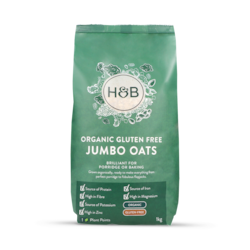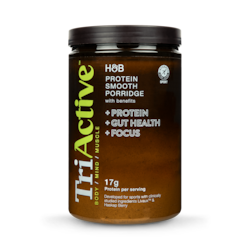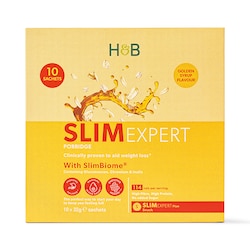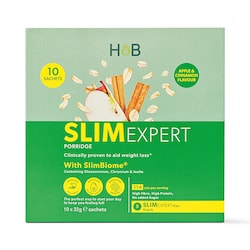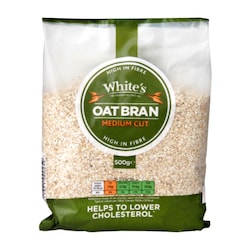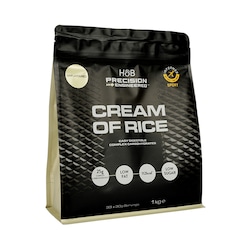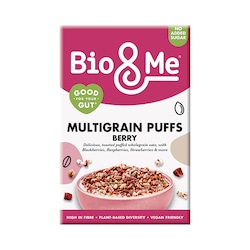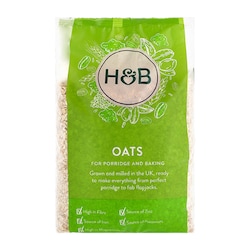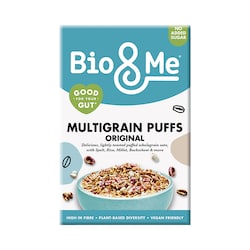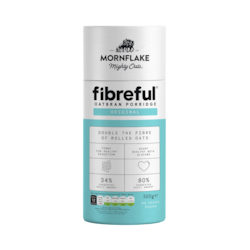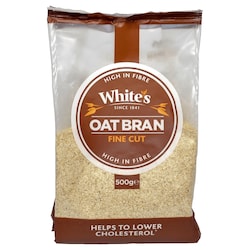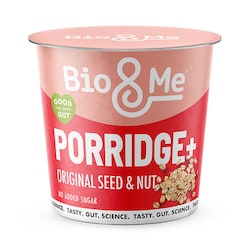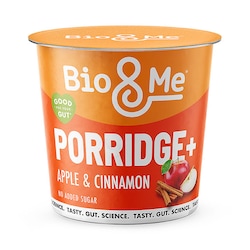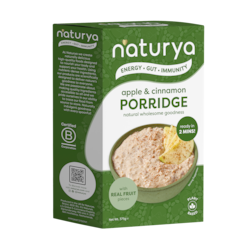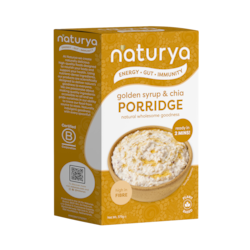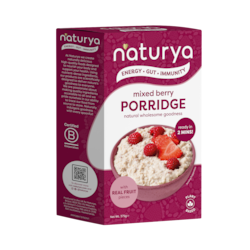20% off £30
Health benefits of oats
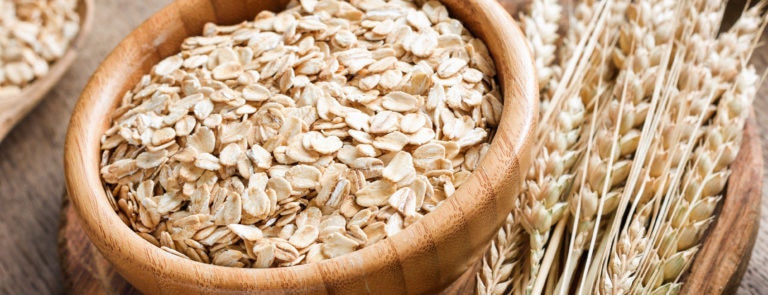
Oats remain a firm breakfast favourite in the UK and are eaten across the globe for their versatility and health benefits.
If you haven’t woken up to the incredible health benefits of oats yet, then read on.
Six reasons to start eating oats every day
These six benefits reveal just how good oats can be for your body.
-
Oats can lower your cholesterol
Oats contain a type of soluble fibre called beta-glucan.
Beta-glucan has been shown to reduce levels of low-density lipoprotein – more commonly known as ‘bad’ cholesterol.1
The beta-glucan in oats mixes with water in your gut to create a gelatinous substance, which binds to bad cholesterol before eliminating it from the body during a trip to the loo.
To experience the cholesterol-lowering effects you’ll need 3g beta-glucan per day, which can be easily met with a bowl of porridge.
-
Oats give you longer-lasting energy
Oats are an excellent energy source as they contain complex carbohydrates.
The body converts all carbohydrates, both simple and complex, into glucose which is then used as energy.
Complex carbohydrates such as oats take longer to digest, as they are made of longer chains of molecules than simple carbohydrates such as white pasta.
Therefore, the rate at which glucose enters the bloodstream is less rapid, provide a slower, longer-lasting energy release.
-
Oats help balance your blood sugar
The beta-glucan in oats slows the rate at which they are converted into glucose by the body. This prevents a sudden raise in blood sugar.
This helps balance your blood sugar – making oats a good choice for people with diabetes.
Fewer blood sugar raises means fewer sugar cravings, too.
-
Oats are packed with nutrients
Oats are full of vitamins, minerals and phytonutrients.
They also contain polyphenols, a plant compound which helps prevent cell damage from harmful free radicals.
Oats are also a source of magnesium, iron, phosphorous, zinc, vitamin B1 and vitamin B5.
-
Oats feed your good gut bacteria
Trillions of bacteria live inside your gut, helping you digest food, absorb nutrients and stay immune from catching nasty bugs.
This bacteria colony, known as your microbiome, needs to be fed properly to work optimally.
Soluble fibre, such as the type found in oats, feeds the good bacteria in your gut so your microbiome stays in balance.
-
Oats promote weight loss
Oats are a great food for helping with losing weight.
They’re both low in calories and promote a feeling of satiety (fullness) due to their fibre content.
The insoluble and soluble fibre in oats adds bulk inside your stomach, which signals to the brain that it’s time to stop eating.
Replacing a daily breakfast high in simple carbohydrates (such as a croissant or bowl of corn flakes) with a bowl of oats will help stop the late-morning energy slump and hunger pangs associated with simple carbohydrate foods.
Handpicked content: How to eat oats
Are oats high in protein and other FAQs
We've answered all the popular questions around oats - keep reading to find out all you need to know.
Q: Are oats high in protein?
Surprisingly high in protein for a grain, oats contain 10.9g protein per 100g.
However, oats on their own aren’t a ‘complete’ protein.
Our bodies need nine essential amino acids to build protein – they’re called ‘essential’ because our bodies can’t make them so we must consume them via food.
‘Complete’ proteins contain adequate amounts of all nine.
Oats contain all nine essential amino acids necessary to make up a complete protein. However, oats don’t have quite enough of the amino acid lysine to qualify as a complete protein.
This is why you should complement your oats with another incomplete protein from another food group, to bump up the quota of lysine to the required amount for a complete protein.
A perfect choice is a sprinkling of pumpkin seeds, or a few cashew nuts.
Q: Are oats high in carbs?
Oats are technically a high-carbohydrate food, with 70.7g carbs per 100g oats. However, the type of carbs that oats contain are known as ‘complex’ carbs – a primary energy source for our bodies.
Oats are complex carbs because they contain plenty of fibre, both soluble and insoluble, as well as beta-glucan.
Beta-glucan is a fibre which forms a gel in your gut - slowing digestion, keeping you fuller for longer and preventing sudden raises in blood sugar.
Therefore, you will experience a slow release of energy after eating oats. T
his is in contrast to when you eat ‘simple’ carbs such as white pasta, which offer a short-term energy boost followed by an energy dip.
Q: Are oats fattening?
Oats contain 381 calories and around 7g unsaturated fat per 100g, and like all foods, can cause us to gain fat if we eat too much without burning them off.
However, oats are not considered a fattening food.
They are filling, thanks to the fibre and beta-glucan, making you less likely to snack or overeat, so you’re very unlikely to gain weight through eating too many oats.
If you load your oats with honey, syrup, sugar or jam, then you’re probably more than doubling the calories of your bowl, so use a sprinkling of dried fruit instead.
Q: Are oats gluten free?
In their pure form, oats are 100% gluten free.
However, most oats are processed and packaged in environments which also produce grains which do contain gluten, such as wheat.
For this reason, cross-contamination in oats is very common and it is advisable for anyone experiencing coeliac disease or a gluten intolerance to only eat oats which are labelled as ‘gluten free’.
Q: Are oats vegan?
Oats are 100% vegan.
If you’re ordering oats in a café, or purchasing oats in individual sachets or pots, you’d need to check if they were vegan as many chefs and manufacturers add non-vegan ingredients to enhance their taste.
Q: What are the different types of oats?
- Pinhead oats (also known as steel-cut oats) are whole oats which have had the inedible hull removed then been coarsely chopped with steel blades. They’re called pinhead oats as the coarse chopping of the oat kernel leaves the rough flakes the same size as the head of a pin!
- Rolled oats are oat kernels which have had their inedible hull removed, then been steamed and rolled, so that they become flattened.
- Quick cook (or instant) oats are rolled oats (as above) which have then been rolled further so they disintegrate. This means they cook faster (in just a couple of minutes).
- Oat bran is not made from the entire oat kernel (minus the inedible hull) as the other types mentioned are. Oat bran is made just from the fibrous outer layer of the kernel.
Q: Can you eat oats on keto?
The ketogenic, or keto, diet is high in unsaturated fat and low in carbohydrates.
The idea behind the keto diet is to trigger in the body a metabolic state called ketosis, where your body burns fat for energy instead of burning carbohydrates.
This way of eating can help some people achieve weight loss and studies have shown its efficacy in helping obese people lose weight.1
Oats are a food high in healthy, complex carbohydrates, so would not be suitable for those on a keto diet.
Q: Are oats low-GI?
The glycaemic index (GI) is a way to measure how a certain food affects the blood sugar after we eat it.
The higher the GI rating, the more rapidly the food causes the blood sugar to raise. Pure glucose is at the top end of the scale with a GI rating of 100.
Oats are classed as a low-GI food with a GI rating of below 55.
Q: Are oats high in sugar?
Oats are a very low-sugar food, with 100g oats containing less than a gram of sugar.
This refers to oats in their dry, un-processed form. If you add semi-skimmed milk, a 40g portion of oats has 8.2g sugar.
This is still low – less than 10% of your recommended daily intake of sugar.
Obviously, adding sugar, honey, syrup, agave or dried fruit will ramp up the sugar content drastically.
Last updated: 17 August 2021


